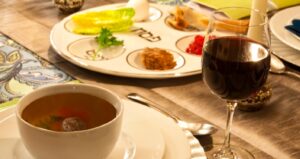
I conducted my first seder in my fourth apartment share in Washington Heights. Since all my Jewish friends were going to seders, I invited ten non-Jewish friends to attend mine.
I made matzoh ball soup, tzimmes with stewed apricots, pears, apples, figs, oranges and a touch of cinnamon and lemon juice and Sephardic charoses with chopped dates, apricots, raisins, walnuts, cinnamon and red wine. I also provided the Passover basics: matzoh (traditional and whole wheat), bitter herbs (red and white horse radish) Manischewitz wine, and a cup for the prophet Elijah and the seder plate. Others brought entrees, side dishes and desserts. (honey cake, chocolate covered matzoh and coconut macaroons).
Later that evening, my friend Nancy, found the afikomen, that I had hidden behind a small painting in the living room.
We sat around the table and read the Haggadah that tells the biblical story of the enslavement of the Israelites in Egypt and their exodus into freedom. We drank the required four cups of wine, maybe more. My friends were eager to learn the stories and to participate in the Passover rituals.
We discussed the meaning of freedom and oppression in the world today. Everyone sang the traditional Passover songs like “Dayenu” and “Chad Gadya” and prayers using the English transliteration. I loved leading the seder which I never could have done before; it was always my grandfather, my father and then my brother.
Customarily, “The Four Questions” are read by the youngest person. I chanted the questions in Hebrew and the others read them in English.
שֶׁבְּכָל־הַלֵּילוֹת, אָֽנוּ אוֹכְלִין בֵּין יוֹשְׁבִין וּבֵין מְסֻבִּין; הַלַּֽיְלָה הַזֶּה, כֻּלָּֽנוּ מְסֻבִּין.
Sheb’chol haleilot anu ochlin bein yoshvin uvein m’subin; halailah hazeh, kulanu m’subin. (4thquestion).
“On all other nights, we eat either sitting upright or reclining. Why on this night do we all recline?”
It felt good to kick off my shoes, to slouch in my chair and to be a free woman.





